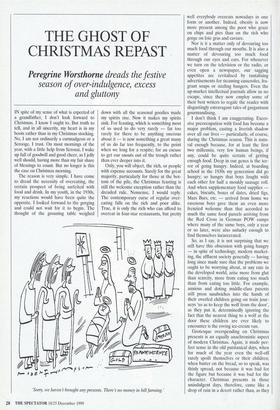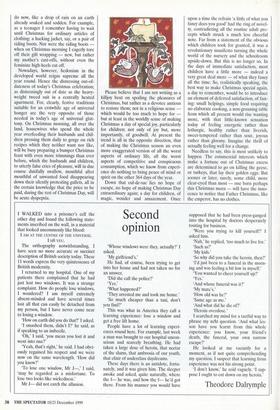THE GHOST OF CHRISTMAS REPAST
Peregrine Worsthorne dreads the festive season of over-indulgence, excess and gluttony
IN spite of my sense of what is expected of a grandfather, I don't look forward to Christmas. I know I ought to. But truth to tell, and in all sincerity, my heart is in my boots rather than in my Christmas stocking. No, I am not ordinarily a curmudgeon or a Scrooge, I trust. On most mornings of the year, with a little help from Seroxat, I wake up full of goodwill and good cheer, as I jolly well should, having more than my fair share of blessings to count. But no longer is this the case on Christmas morning.
The reason is very simple. I have come to dread the necessity of overeating, the certain prospect of being surfeited with food and drink. In my youth, in the 1930s, my reactions would have been quite the opposite. I looked forward to the gorging and could not wait for it to begin. The thought of the groaning table weighed down with all the seasonal goodies made my spirits rise. Now it makes my spirits sink. For feasting, which is something most of us used to do very rarely — far too rarely for there to be anything onerous about it — is now something a great many of us do far too frequently, to the point when we long for a respite; for an excuse to get our snouts out of the trough rather than ever deeper into it.
Only, you will object, the rich, or people with expense accounts. Surely for the great majority, particularly for those at the bot- tom of the pile, the Christmas feasting is still the welcome exception rather than the dreaded rule.. Nonsense, I would reply. The contemporary curse of regular over- eating falls on the rich and poor alike. True, it is only the rich who can afford to overeat in four-star restaurants, but pretty 'Sony, we haven't brought any presents. There's no money in hill farming.' well everybody overeats nowadays in one form or another. Indeed, obesity is now more present among the poor who graze on chips and pies than on the rich who gorge on foie gras and caviare.
Nor is it a matter only of devouring too much food through our mouths. It is also a matter of devouring too much food through our eyes and ears. For whenever we turn on the television or the radio, or even open a newspaper, our sagging appetites are • revitalised by tantalising advertisements for steaming casseroles, fra- grant soups or sizzling bangers. Even the up-market intellectual journals allow us no escape, since they now employ some of their best writers to regale the reader with disgustingly extravagant tales of gargantuan gourmandising.
I don't think I am exaggerating. Exces- sive preoccupation with food has become a major problem, casting a liverish shadow over all our lives — particularly, of course, during the Christmas season. This is natu- ral enough because, for at least the first two millennia, very few human beings, if any, could be quite certain of getting enough food. Deep in our genes is the ter- ror of going hungry. Indeed, at boarding school in the 1930s my generation did go hungry; so hungry that boys fought with each other for half a mouldy sausage roll. And when supplementary food supplies — cakes, biscuits, boxes of dates, dried figs, Mars Bars, etc. — arrived from home we ravenous boys gave them an even more frenzied welcome than that accorded to much the same food parcels arriving from the Red Cross in German POW camps where many of the same boys, only a year or so later, were also unlucky enough to find themselves incarcerated.
So, as I say, it is not surprising that we still have this obsession with going hungry — in spite of technology, modern market- ing, the affluent society generally — having long since made sure that the problems we ought to be worrying about, at any rate in the developed world, arise more from glut than scarcity, more from eating too much than from eating too little. For example, anxious and doting middle-class parents still press sandwiches into the hands of their overfed children going on train jour- neys `so as to keep the wolf from the door', as they put it, determinedly ignoring the fact that the nearest thing to a wolf at the door these children are ever likely to encounter is the roving ice-cream van.
Grotesque overspending on Christmas presents is an equally anachronistic aspect of modern Christmas. Again, it made per- fect sense in the old puritanical days, when for much of the year even the well-off rarely spoilt themselves or their children; when butter on the bread, so to speak, was thinly spread, not because it was bad for the figure but because it was bad for the character. Christmas presents in those unindulgent days, therefore, came like a drop of rain in a desert rather than, as they
do now, like a drop of rain on an earth already soaked and sodden. For example, as a teenager I remember having to wait until Christmas for ordinary articles of clothing: a hacking jacket, say, or a pair of riding boots. Nor were the riding boots — when on Christmas morning I eagerly tore off their gift wrapping — new, but rather my mother's cast-offs, without even the feminine high-heels cut off.
Nowadays, however, hedonism in the developed world reigns supreme all the year round. Hence the distressing out-of- dateness of today's Christmas celebration; as distressingly out of date as the heavy- weight tweed suit in a centrally heated apartment. For, clearly, festive traditions suitable for an erstwhile age of universal hunger are the very opposite of those needed in today's age of universal glut- tony. On Christmas morning, all over the land, housewives who spend the whole year overfeeding their husbands and chil- dren pressing them daily to gorge on rich recipes which they neither want nor like, will be busy preparing a bumper Christmas feast with even more trimmings than ever before, which the husbands and children, to utterly false cries of pleasure, will in due course dutifully swallow, mouthful after mouthful of unwanted food disappearing down their silently protesting gullets, all in the certain knowledge that the price to be paid, during the rest of Christmas Day, will be acute dyspepsia. Please believe that I am not writing as a killjoy bent on spoiling the pleasures of Christmas, but rather as a devotee anxious to restore them; not in a religious sense — which would be too much to hope for — but at least in the worldly sense of making Christmas a day of special joy, particularly for children; not only of joy but, more importantly, of goodwill. At present the trend is all in the opposite direction, that of making the Christmas season an even more exaggerated version of all the worst aspects of ordinary life, all the worst aspects of competitive and conspicuous consumption, which we know from experi- ence do nothing to bring peace of mind or spirit on the other 364 days of the year.
Down that cul-de-sac lies no hope of escape, no hope of making Christmas Day extraordinary again; a day for children, of magic, wonder and amazement. Once upon a time the refrain 'a little of what you fancy does you good' had the ring of novel- ty, contradicting all the routine adult pre- cepts which struck a much less cheerful note. Far from a statement of the obvious which children took for granted, it was a revolutionary manifesto turning the whole world of the nursery and the schoolroom upside-down. But this is no longer so. In the days of immediate satisfaction, most children have a little more — indeed 'a very great deal more — of what they fancy all the time. So, realistically speaking, the best way to make Christmas special again, a day to remember, would be to introduce an element of deferred satisfaction, of fast- ing: small helpings, simple food requiring no elaborate cooking, a non-groaning table from which all present would rise wanting more, with that little-known sensation today of feeling energetic rather than lethargic, healthy rather than liverish, sweet-tempered rather than sour, joyous rather than gloomy. Imagine the thrill of actually feeling well for a change.
Needless to say, this is most unlikely to happen. The commercial interests which make a fortune out of Christmas excess are determined to go on killing the geese, or turkeys, that lay their golden eggs. But sooner or later, surely, some child, more clear-eyed than most — one born perhaps this Christmas morn — will have the inno- cence to notice that Father Christmas, like the emperor, has no clothes.























































































































 Previous page
Previous page